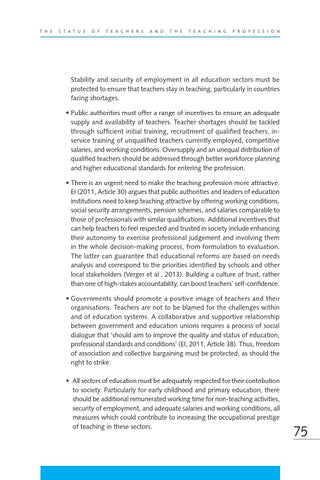T H E
S T A T U S
O F
T E A C H E R S
A N D
T H E
T E A C H I N G
P R O F E S S I O N
Stability and security of employment in all education sectors must be protected to ensure that teachers stay in teaching, particularly in countries facing shortages.
• Public authorities must offer a range of incentives to ensure an adequate supply and availability of teachers. Teacher shortages should be tackled through sufficient initial training, recruitment of qualified teachers, inservice training of unqualified teachers currently employed, competitive salaries, and working conditions. Oversupply and an unequal distribution of qualified teachers should be addressed through better workforce planning and higher educational standards for entering the profession.
• There is an urgent need to make the teaching profession more attractive. EI (2011, Article 30) argues that public authorities and leaders of education institutions need to keep teaching attractive by offering working conditions, social security arrangements, pension schemes, and salaries comparable to those of professionals with similar qualifications. Additional incentives that can help teachers to feel respected and trusted in society include enhancing their autonomy to exercise professional judgement and involving them in the whole decision-making process, from formulation to evaluation. The latter can guarantee that educational reforms are based on needs analysis and correspond to the priorities identified by schools and other local stakeholders (Verger et al., 2013). Building a culture of trust, rather than one of high-stakes accountability, can boost teachers’ self-confidence.
• Governments should promote a positive image of teachers and their organisations. Teachers are not to be blamed for the challenges within and of education systems. A collaborative and supportive relationship between government and education unions requires a process of social dialogue that ‘should aim to improve the quality and status of education, professional standards and conditions’ (EI, 2011, Article 38). Thus, freedom of association and collective bargaining must be protected, as should the right to strike.
• All sectors of education must be adequately respected for their contribution to society. Particularly for early childhood and primary education, there should be additional remunerated working time for non-teaching activities, security of employment, and adequate salaries and working conditions, all measures which could contribute to increasing the occupational prestige of teaching in these sectors.
75
